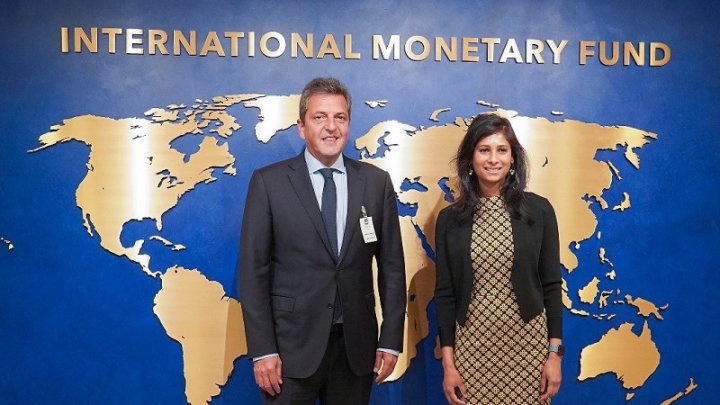
Economy Minister Sergio Massa once again leaves for Washington to meet with the IMF. He August 23rd It will be the board meeting to approve the technical understanding and the Unión por la Patria candidate awaits the go-ahead for the agreed disbursements to be released.
Massa’s agenda will last two days, including meetings with representatives of the World Bank, the IDB and the Treasury Department; also with the State Department and the IMF, according to the Télam agency.
The Government negotiates an extension of disbursementsto some US$10.5 billion, instead of the US$ 7,500 million that the IMF plans to deliver to cover the maturities that have already been paid. The Fund has been pressing to impose greater conditions. What will be its new demands to deliver extra dollars to a government that is risking its continuity in October?
Massa brings an offering to the Fund having applied his recipe after Sunday’s elections: devaluation, interest rate hikes, spending adjustments, and the government has already anticipated increases in public utility rates.
The minister pointed against the IMF for the devaluation in an interview in TN. According to Massa, “the IMF asked for 100% devaluation, then it went down to 60% and finally we managed to agree on 20%”, he presented it almost as the best possible negotiation. It is striking that Martín Guzmán, former Minister of Economy, said the same thing when he closed the agreement with the international organization and presented it as the “best agreement that could be achieved.” Months later, he revealed that the Fund is the same as always and that it was far from being a benevolent agreement for the popular majorities.
The measures to alleviate the pockets as the candidate minister promised in an interview in C5N of fixed sum and reinforcement for social allocations and AUH would be known this week, is the ok from the Fund missing? The measures, as the minister stated, would be to “mitigate the damage”, but they do not aim to restore the purchasing power of income lost in recent years.
Benefits for remarkers
After the official devaluation, the blue dollar climbed $155 in the first three days of the week, and then fell, closing at $720 on Friday. In relation to the Friday before the PASO, it increased by 19%. This exchange rate also puts pressure on prices. Large companies took advantage of this shock to highlight. Thus, for example, Arcor delivered its price list to supermarkets with a 25% increase, Molinos Río de la Plata presented a similar increase, Unilever with 27%, Playadito yerba 12%, Quilmes 20% and wineries 15%, as detailed by Alejandro Bercovich in the Bae Negocios newspaper. A scam since there are no firms that have all of their imported inputs in the products they sell.
In the race to preserve profit margins, the economic groups that have the greatest concentration in the production and marketing of merchandise have the upper hand.
Last Friday the Minister of Economy announced that the Government closed a price agreement with supermarkets and wholesalers for mass consumption products, which will include staggered increases of 5% per month for the next 90 days. The pact includes fiscal benefits for companies that adhered and a credit scheme at subsidized rates for companies supplying supermarkets. That is After speculating with food, the Government rewards them with benefits. In addition, it must be remembered that there were complaints about companies that evaded the official price programs, or failed to supply the products. Why would this time be different? That is why it is necessary to organize workers and consumers committees on all essential product chains, from production, distribution to sale in large supermarkets. In this way, large supermarket and hypermarket chains could be prevented from remarking prices. It is also necessary opening of accounting records. That is the only way to verify the real profits of big companies.
Prior to the devaluation, the Basic Food Basket, which measures the line of indigence, increased 125.7% in the last twelve months, according to INDEC. It was an increase higher than inflation in the same period (113.4%). The same thing happened with the Poverty basket. The rise in the official dollar will accelerate this increase, which will worsen the pocket of the working class.
This is an alarming situation when the Minimum salary, vital and movil in September it will be $118,000, two people who receive this salary ($236,000) no longer cover the poverty basket for July ($248,962). Further away is the minimum wage of the basket made by INDEC workerswhich includes the cost of rent, and in July it was $384,657. That’s why it’s urgent an emergency increase in wages, pensions and social programs. The CGT and the CTA should fight to recover what they lost and face the looting in progress.
Adjust to Bottom
Massa’s scissors continued to cut spending, except for debt. According to the latest report from the Congressional Budget Office (OPC), in the first seven months of the year primary spending fell 8.3% in real terms while interest on the debt increased 21.2%. The priorities of the candidate minister are in sight.
According to the report the most important real casualties were registered in transfers to provinces (-28.0%), in family allowances (-25.3%), in energy subsidies (-22.9%) and in social programs (-21.3 %) as Accompany Program, Food Benefit and Strengthen Work. OPC notes that “in the case of retirement and pensions, although the real decrease was more limited (3.8% YoY), it was the fourth item with the greatest contribution to the reduction in spending given its participation in the structure of the primary spending”. The deterioration in the income of the elderly was one of those that contributed to the adjustment of Massa’s spending in the first seven months of the year.
On the other hand, total income between January and July of this year decreased 5.1% in real terms with decreases in tax income such as export, import and Country Tax duties. For this reason, Massa’s adjustment in sensitive items is not enough for the Fund, which maintains the primary fiscal deficit target of 1.9% of GDP for this year. The Unión por la Patria candidate sang a retort and offered a Zero Deficit for next year.
A measure that coincides with what the Milei and Bullrich teams discussed with Fund officials. Both Luciano Laspina and Carlos Melconian from Bullrich’s team assured that they agree to reduce the fiscal deficit in the virtual meeting with the IMF. Javier Milei also met with the organization and assured that they would not have a problem with him because he proposes a more important fiscal adjustment than what they demand.
Facing October, the bosses’ candidates agree that the helm of the economy will be handled by the Fund, submission to the empire will continue. Only the Unity Left Front proposes rejecting the debt mortgage through mobilization due to its sovereign ignorance.
Source: www.laizquierdadiario.com

